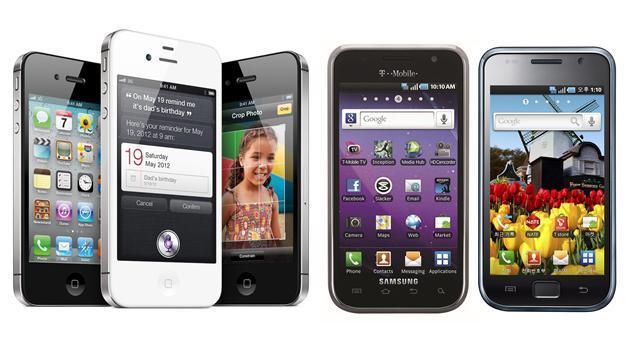South Korea bans Samsung, Apple products
SEOUL - Agence France-Presse

A composite image made of handout images supplied by Apple (L), showing three views of the Apple iPhone 4S, and by Samsung showing Samsung's Galaxy S 4G (2-R) and Galaxy S (R) smartphones. EPA photo
Apple and Samsung infringed on each other's patents on mobile devices, a Seoul court ruled Friday, awarding damages to both technology giants and imposing a partial ban on product sales in South Korea.The ruling is part of a bitter international patents battle between the two rival firms and comes ahead of a high-stakes US jury verdict expected to set the course of their tussle for smartphone and tablet PC supremacy.
The Seoul Central District Court ruled that Apple breached two of Samsung's technology patents, and ordered it to pay 40 million won ($35,242) in damages.
It also ordered Samsung to pay 25 million won for violating one of Apple's patents. Each company had sought damages of 100 million won from the other.
The judges said there was "no possibility" that consumers would confuse Samsung and Apple smartphones -- a key issue in the US trial -- and that Samsung's smartphone icons do not infringe Apple's patents.
But it said Samsung infringed Apple's patent for bounce-back technology. Apple's signature bounce-back design is the widely copied spring-back behaviour that occurs when a user reaches the edge of a document.
The court banned sales in South Korea of Apple's iPhone 4 and iPad 2, as well as Samsung's Galaxy S, Galaxy SII and Galaxy Nexus smartphones, and the Korean firm's Galaxy Tab and Galaxy 10.1 tablets.
But the banned products do not include the latest models from either firm such as the iPhone 4S and the Galaxy S3 smartphones.
Samsung launched the case in South Korea, along with several other countries, in its first response to an Apple lawsuit in a US court that started the legal battle in April 2011.
Apple says Samsung "slavishly" copied its smartphones and tablets and violated its design patents. Samsung says Apple is using some of its patented wireless communication technology.
Analysts said the split ruling was not expected to have an impact on the broader dispute, which involves legal action in nine countries.
"Samsung scored a partial victory over Apple in that the court rejected Apple's key allegations that Samsung copied its design," James Koo of Kyobo Securities told AFP.
The court, however, accepted Apple's assertion that Samsung infringed its touchscreen "bounce-back" technology, Koo noted.
"However, this is unlikely to affect the impending verdict in California, Apple's home turf," he said.
Seo Won-Seok of Korea Investment and Securities said the sales ban was expected to have only a limited impact as it does not cover the latest models.
While the results so far have been mixed in courts in Europe and Australia, Samsung has much at stake in the US case in San Jose, which could result in large damages or injunctions against its products in the American market.
In the US court, Apple is seeking more than $2.5 billion after accusing the Korean firm of infringing designs and other patents. Samsung says Apple breached its patents for wireless communication.
Samsung extended its lead over Apple in the smartphone market in the second quarter despite slowing demand for mobile phones, according to a recent survey by research firm IDC.
Samsung shipped 50.2 million smartphones globally in April-June, while Apple sold 26 million iPhones, IDC said.
















